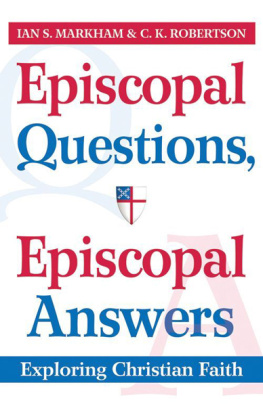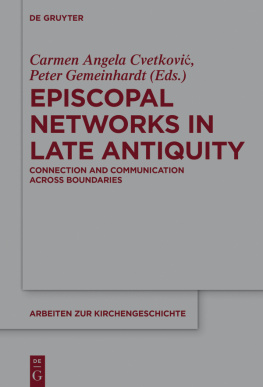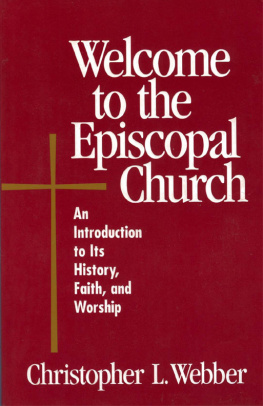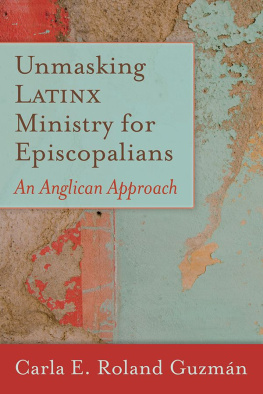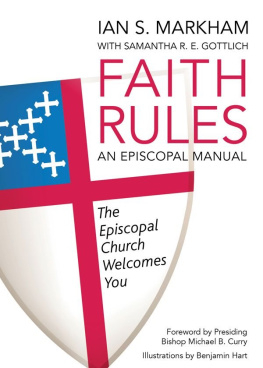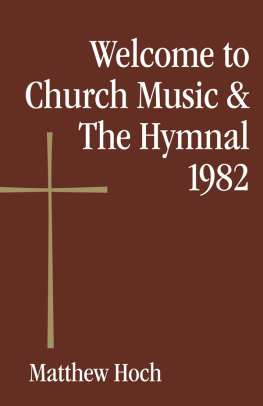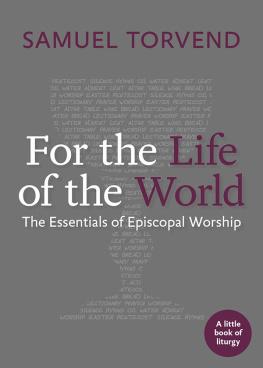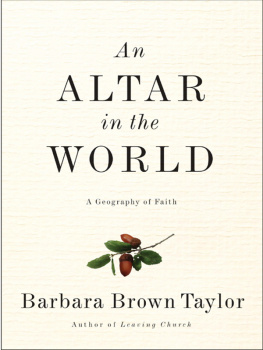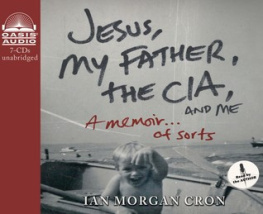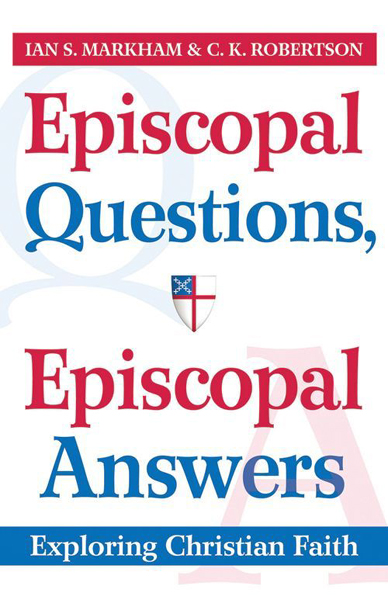

Copyright 2014 by Ian Markham and C. K. Robertson
All rights reserved. No part of this book may be reproduced, stored in a retrieval system, or transmitted in any form or by any means, electronic or mechanical, including photocopying, recording, or otherwise, without the written permission of the publisher.
Unless otherwise noted, the Scripture quotations contained herein are from the New Revised Standard Version Bible, copyright 1989 by the Division of Christian Education of the National Council of Churches of Christ in the U.S.A. Used by permission. All rights reserved.
Morehouse Publishing, 4785 Linglestown Road, Suite 101, Harrisburg, PA 17112
Morehouse Publishing, 19 East 34th Street, New York, NY 10016
Morehouse Publishing is an imprint of Church Publishing Incorporated.
www.churchpublishing.org
Cover design by Laurie Klein Westhafer
Typeset by Rose Design
Library of Congress Cataloging-in-Publication Data
Markham, Ian S.
Episcopal questions, Episcopal answers : exploring Christian faith / Ian Markham and C. K. Robertson.
pages cm.
Includes bibliographical references.
ISBN 978-0-8192-2309-8 (pbk.)ISBN 978-0-8192-2914-4 (ebook) 1. Episcopal ChurchDoctrinesMiscellanea. I. Title.
BX5930.3.M37 2014
283'.73dc23
2013042418
We dedicate this book to our respective childrenLuke Markham and David, Jonathan, and Abby Robertsonhere is hoping that you find the Episcopal Church provides some of the answers to those difficult life questions you will face
We are grateful to Davis Perkins for the invitation to write this book. We are grateful to our respective colleagues who understand how important writing is for usto Presiding Bishop Katharine Jefferts Schori and to the Board and Senior Team of Virginia Theological Seminary.
We are especially grateful to colleagues who help make our days manageable: Katherine Malloy and Ednice Baerga.
As the manuscript was near completion, we are grateful to the Rev. Dr. Barney Hawkins, the Rev. Dr. James Farwell, and the Rev. Gray Magganio. They gathered for an evening and shared their questions and thoughtful comments on the manuscript. We are also grateful to Ms. Shannon Preston and Ms. Isabella Blanchard who worked hard to finalize the manuscript for the publishers.
Finally, we are grateful to our respective wivesLesley and Debbiewho understand our preoccupation with writing and tolerate our absence as we finish a section. And we are two fathers who pray often for our children: so we offer this little book to them.
Ian Markham and Charles Robertson
We want you to enjoy thinking about the questions and musings on the answers. The following introduction gives you a sense of the history of the Episcopal Church, but if you want to go straight to the Q&A, skip this introduction and come back later.

What do Episcopalians believe about ? Despite the name of this book, this seemingly clear-cut question is not necessarily an easy one to answer, at least on one level. Todays Episcopal Church is anything but homogeneous. We have congregations in every state of the Union, as well as in Puerto Rico and the Virgin Islands, Haiti and the Dominican Republic, Honduras and Venezuela, Colombia and Ecuador, Micronesia and Taiwan, and a convocation of churches in Europe. English, Spanish, French, and several other languages can be heard every week in our churches. In our affiliations and in our politics, in our backgrounds and in our vocations, we cover the full range of the continuum.
And yet at the same time, with all our diversity we are first and foremost a people of common prayer. Together we share a common heritage, one Lord, one faith, one baptism. Each time we gather we profess, We believe in one God. While never losing sight of the differences that make us many, the pages that follow reflect those commonalities that make us onethat make us not simply Christians, but Episcopal Christians. As such, it is hoped that these questions and answers will prove helpful for long-time members and interested seekers alike, as a means of deepening understanding about who we are and what we are about. Before diving in to the Q&A, however, it might be useful to step back a bit, offer some historical context, and consider what is the first question of the book, Who are we?
NEW TESTAMENT ROOTS
Our roots extend back a long way. Indeed, one could say that the Episcopal ethos can be found at the very beginning of Christianity, in a place called Antioch. There an encouraging newcomer-turned-church-leader named Barnabas and his bold apprentice, Saul of Tarsus, helped form something connected to, but distinct from, the church in Jerusalem. In the latter, Peter and the other apostles preached and healed, but did so always in the shadow of the Jewish temple. Their group, the Way, as it was known, was an inspiring, Spirit-filled community, but it was still a Jewish sect and its leaders still went daily to the temple where sacrifices were made.
Antioch was something else entirely, where Greeks as well as Jews heard the Good News proclaimed and formed a faith community entirely separate from temple and sacrifices, an intentionally diverse yet unified community. As is clear in the eleventh chapter of Acts, it was in Antioch, not in Jerusalem, that the disciples were first called Christians. And it was from Antioch that Barnabas and Saul (now Paul), a new breed of apostolic missionaries, were sent forth to plant communities of faith, love, and hope wherever they went. Again, these churches would be marked by diversity as well as unity: There is neither Jew nor Greek, slave nor free, male nor female, but all are one in Christ. It was rarely an easy task, for diversity is a nice word to say but a hard reality to appreciate. In places like Corinth, for example, the wealthier church members did not want to wait for those field workers and others on the lower socioeconomic level before having their communal meal. The battle over recognizing the uncircumcised may now seem quaint, but then was quite grim.
Still, often despite its own infighting, the movement flourished. And what began there in one small part of the Mediterranean region soon spread throughout the Roman Empire, eventually reaching even the British Isles. Tradition has it that no less a figure than Joseph of Arimathea, the follower of Jesus who donated his own tomb for the Crucified Ones burial, traveled to those Isles and planted the gospel, where it took root and grew. Legends surround the misty origins, but certainly by the time of the Council of Nicaea in 325, there were Christians in Britain. Representatives from there attended that council from which emerged the Nicene Creed that is still proclaimed week after week in our churches.
THE CHURCH IN ENGLAND
Over two hundred and fifty years later, those same isles witnessed the arrival of a somewhat reluctant missionary-monk from Rome named Augustine, sent by Pope Gregory, called the Great. This monk was to bring the faith to the land of the Anglos, or angels as Gregory called them. Augustine set up his base in the southeastern region known as Kent, where Aethelbert was king, for there the faith was already in existence, the queen herself being a believer. But the faith he encountered there looked and felt different than that which was familiar to Augustine. It was a Celtic form of Christianity, not Roman. Augustine wrote to Gregory, sharing his concerns, asking how he might show those Celtic Christians the error of their ways and help them to be more Roman. Gregorys reply evidences great wisdom as well as patience, urging Augustine to take the best of what he found, along with the best of what he brought with him, and worry less about the rest. It was a response worthy of Barnabas the Encourager. Eventually, Roman ways would indeed win out, as prescribed at a synod or meeting in a northeastern town called Whitby, but Celtic ways and Celtic leaders would continue to shape Christianity in the Isles as it developed into something connected to, but somehow distinct from, the religious establishment in continental Europe.

